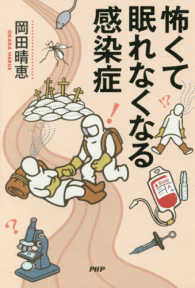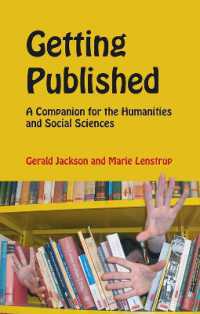Full Description
This thought-provoking book covers the full range of psychopharmacologic practice in textbook fashion, offering a fresh and comprehensive self-examination. Unlike conventional texts of psychopharmacology, this text speaks directly to clinicians who have started to question the limitations of psychopharmacologic claims and the rigid confines of DSM-5 diagnoses. Drawing from their clinical and research experience as well as new literature, the well-published authors provide a new perspective that encourages readers to reevaluate established practices and embrace that medication is just one component of treatment and has limits. The book could be used by psychiatric residents in their course of study, by clinical psychology students taking a psychopharmacology course, or by psychiatrists curious to get a readable but comprehensive look at new critical viewpoints in psychopharmacology that have changed since they were taught. Many neuroscience students who are looking for areview of clinical effects to guide their basic research may also find the proposed text more useful than those texts that collate clinical trials.
Current texts are for specialized scientists or are part of multi-authored texts which list drugs alphabetically with no conceptual framework, or books that pretend that each biochemical drug property has a clear and known clinical result presented in cartoon style. Some lesser known texts for psychology or nursing students are not authoritative. Others aimed at patients or families are too simplistic for clinicians. The authors' goal was to create a unified text expressing their view of psychopharmacology, its evidence base, the unity of its essential principles, and its independence of DSM or ICD diagnosis.
Several new history books describe the "rise and fall" of psychopharmacology, the corruption of big pharma and the failure of large controlled clinical trials. Psychopharmacology Reconsidered: A Concise Guide Exploring the Limits of Diagnosis and Treatment ensures that young clinicians are aware of and understand this critical zeitgeist but aware also of the essential core of psychopharmacology and the evidence upon which it rests.
Contents
Biochemical basis for psychopharmacology in the brain synapse.-Are DSM or ICD diagnoses the basis for scientific use of psychopharmacologic drugs.-The clinical control trial: What it is, what is has been and does it have a future?.-Antidepressant drugs: For anyone sad or only for the melancholic depressed?.-Antipsychotic drugs: Do they define schizophrenia or do they depress all emotions?.-Antianxiety medications: Are they addictive or are they mankind's precious heritage?.-Mood stabilizers: Is lithium the gold standard?.-Electroconvulsive therapy, transcranial magnetic stimulation and deep brain stimulation.-Addictive substances and pain medication.-Stimulant drugs: Are they specific for attention deficit disorder and are they abused and overused?.-Drugs for Alzheimer's and other dementia: Are they worth anything?.-Drugs for obsessive compulsive disorder: could such obviously psychological disorders have a pharmacological treatment?.-Cannabis: A Useful Psychotropic?.-The placeboresponse in psychopharmacology and the use of nutraceuticals in clinical psychiatry.-Chapter 15: Is there a potential for new treatments in psychopharmacology or have we picked all the low hanging fruit?








